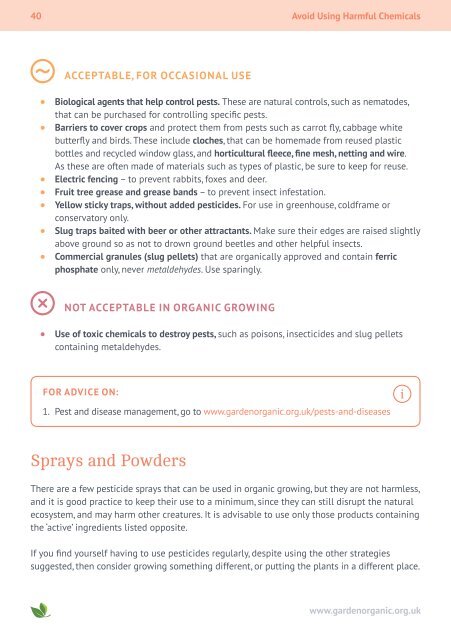Garden Organic Booklet - Final Draft 01
Create successful ePaper yourself
Turn your PDF publications into a flip-book with our unique Google optimized e-Paper software.
40 Avoid Using Harmful Chemicals<br />
Avoid Using Harmful Chemicals<br />
ACCEPTABLE, FOR OCCASIONAL USE<br />
• Biological agents that help control pests. These are natural controls, such as nematodes,<br />
that can be purchased for controlling specific pests.<br />
• Barriers to cover crops and protect them from pests such as carrot fly, cabbage white<br />
butterfly and birds. These include cloches, that can be homemade from reused plastic<br />
bottles and recycled window glass, and horticultural fleece, fine mesh, netting and wire.<br />
As these are often made of materials such as types of plastic, be sure to keep for reuse.<br />
• Electric fencing – to prevent rabbits, foxes and deer.<br />
• Fruit tree grease and grease bands – to prevent insect infestation.<br />
• Yellow sticky traps, without added pesticides. For use in greenhouse, coldframe or<br />
conservatory only.<br />
• Slug traps baited with beer or other attractants. Make sure their edges are raised slightly<br />
above ground so as not to drown ground beetles and other helpful insects.<br />
• Commercial granules (slug pellets) that are organically approved and contain ferric<br />
phosphate only, never metaldehydes. Use sparingly.<br />
NOT ACCEPTABLE IN ORGANIC GROWING<br />
• Use of toxic chemicals to destroy pests, such as poisons, insecticides and slug pellets<br />
containing metaldehydes.<br />
ACCEPTABLE, FOR OCCASIONAL USE<br />
• Plant oils and other plant based products, such as citrus oils, and commercially available<br />
products certified for organic growing. See The <strong>Organic</strong> <strong>Garden</strong>ing Catalogue.<br />
• Microbes and microbial extracts such as Bacillus thuringiensis (Bt). However, these are<br />
only available to professional growers.<br />
• Fatty acid potassium salt soaps.<br />
• Potassium bicarbonate for the treatment of powdery mildew.<br />
• Sulphur – used as a tonic for sulphur deficient soils.<br />
• Diatomaceous earth. The dust from diatomaceous earth is used as an insecticide,<br />
causing insects to dry out and die.<br />
NOT ACCEPTABLE IN ORGANIC GROWING<br />
• Any active ingredient/product not registered with the HSE Pesticides Guidance.<br />
This includes homemade pesticide sprays, those made from washing up liquid,<br />
chilli powder or any other household products.<br />
• Copper based fungicides. <strong>Organic</strong> farmers have to apply for special permission to use this.<br />
Rodent Control<br />
FOR ADVICE ON:<br />
1. Pest and disease management, go to www.gardenorganic.org.uk/pests-and-diseases<br />
Sprays and Powders<br />
There are a few pesticide sprays that can be used in organic growing, but they are not harmless,<br />
and it is good practice to keep their use to a minimum, since they can still disrupt the natural<br />
ecosystem, and may harm other creatures. It is advisable to use only those products containing<br />
the ‘active’ ingredients listed opposite.<br />
ACCEPTABLE, FOR OCCASIONAL USE<br />
• Mouse and rat traps.<br />
• Rat and mouse poisons, approved by the HSE Pesticides Guidance, used in tamper-proof<br />
bait stations.<br />
NOT ACCEPTABLE IN ORGANIC GROWING<br />
• Any active ingredient/product not registered as a poison with the HSE Pesticides Guidance.<br />
If you find yourself having to use pesticides regularly, despite using the other strategies<br />
suggested, then consider growing something different, or putting the plants in a different place.<br />
www.gardenorganic.org.uk<br />
Explanations of highlighted words can be found in the Glossary on page 50<br />
41



